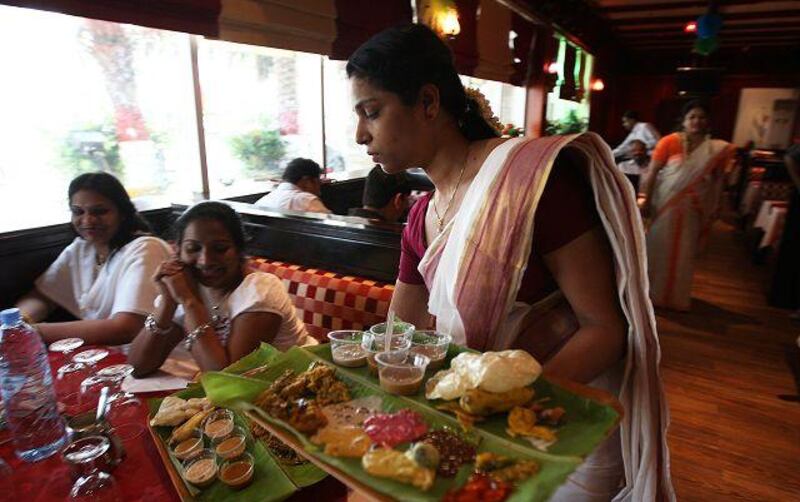ABU DHABI // A dozen guests sat on the floor of Shanta Balakrishnan's flat in a Tourist Club area highrise yesterday, all eager to dig into the sadhya, or feast, she had spent two days preparing for Vishu. Mrs Balakrishnan had spent the morning furiously whipping up the main courses for the New Year's feast celebrated in the Indian state of Kerala, including avial, a mixed vegetable curry in a coconut gravy; a shrimp and mango curry; and a mixed coconut and yogurt dish.
She had also prepared 18 vegetarian side dishes, along with rice and sambhar, a lentil soup. Guests from seven Keralan families all shared the sumptuous lunch. The women wore traditional saris in white with gold borders. The children waited impatiently for the meal to be served on banana leaves. Theirs was just one of many such parties across the country yesterday to mark the cultural New Year being celebrated by various communities in India, Bangladesh and Sri Lanka.
"This is normal," said one of her guests, Sudhir Jones. "The side dishes are like samplers. Sometimes up to 26 side dishes are prepared. My family always celebrates Vishu here with other families. We've been doing this for the past 10 years." Mr Jones's nine-year-old son, Andrew, dressed in a white kurta and pyjamas, received Vishukaineetam, or tokens of money, from the elders. He had managed to collect Dh50 by late afternoon. Later that evening, he joined his friends at the Kerala Social Centre for an evening of dancing and singing to usher in the New Year.
The traditional Vishu lunch, along with its many dishes, was served at several Indian restaurants as well. The Nalukettu restaurant at the Dubai Grand Hotel in Al Qusais said it was expecting about 450 guests for the meal and had prepared takeaway packages for workers who did not have time for a sit-down lunch. Arun Menon, a customer who had brought all his colleagues to the restaurant for the traditional meal, said: "We have been planning this for weeks and we decided to come along together.
"It helps us connect to India; to Kerala. The celebrations will continue as the weekend is coming. We don't get this often. Last year, Vishu was in the middle of the week and we could not enjoy it." Other communities also ushered in the New Year. For the people of Andhra Pradesh it is Ugadi. Punjabis have named it Baisakhi, while in Tamil Nadu it is Varsha Pirappu. West Bengalis refer to it as Poila Baishak. Bangladeshis mark it as Boishakh. The Sinhalese in Sri Lanka celebrated on Wednesday.
The South Asian New Year is based on the solar calendar and marks the end of the harvest season. It begins in mid-April in the Gregorian calendar or during the month of Bak, according to the Buddhist calendar. Mr Jones said: "When you come abroad, you get to celebrate with all the other communities. Otherwise in Kerala, it is just our New Year and you see the festivities everywhere which makes it common, but here it feels more special."
As part of celebrations, two rock bands, LRB and the Miles Band, will play alongside Mila, a Bangladeshi pop star, in Ajman. The Bangla Youth Association will open the show with songs from their upcoming album, Bangla Youth Project. Salim Parvez, the president of the Dubai-based Bangla Youth Association, said: "This is the first time and it is our biggest get-together. We have some of the biggest stars from Bangladesh coming here to celebrate with us."
At the Indian Social Centre in Abu Dhabi, rehearsals were on for today's celebrations. Eight different folk dances from the various states will perform. Rajah Balakrishna, the centre's vice president, said: "This is an occasion where all the communities meet and come together. This is a very important thing, especially for the expatriate children, who get to learn about their culture." @Email:sbhattacharya@thenational.ae
* With additional reporting by Praveen Menon and Maryam Amiri






